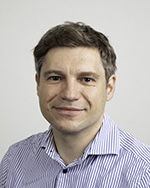Welcome to: Dominik Fischer, Science Manager
Dr. Dominik Fischer joined MIMS in June 2020 as Science Manager. Here, he explains more about his role and what the Nordic EMBL Partnership annual meeting will look as it takes place online for the first time in September 2020.

Can you tell us a bit more about your role as Science Manager at MIMS?
My role is very much split into two. I’m responsible for some day to day tasks, such as coordinating events, the preparation and follow-up of meetings, and some of the general admin duties that keep things running smoothly.
The other side of my role is more strategic and political in nature. This involves me working to strengthen MIMS’ existing networks and projects, whilst identifying research needs or new trends. In the longer term, I will also work to identify relevant stakeholders and to build MIMS’ relations with these. I hope this will ultimately help to encourage more research collaborations and activities on different levels; ranging from a regional to a European level.
What are you hoping your first year in the role to look like?
I hope that I will be able to provide the MIMS group leaders with a supportive and productive environment, and in turn, contribute to new research projects and other platforms that support their work. I also hope to help stimulate further collaborations within the Nordic EMBL Partnership. For example, one long term wish would be to identify a common project where all of the synergies of the Nordic EMBL Partnership can be used. We might be able to make this happen by sharpening the profile of the Partnership, and also through recruiting people with the right mix of research interests. I certainly think I could use my experience in recruitment here to help encourage more common Partnership recruitment activities.
COVID-19 is certainly presenting some challenges to the research community right now. Can you tell us a bit more about how the Nordic EMBL Partnership meeting 2020 will look?
For the first time, the Nordic EMBL Partnership meeting will take place entirely online which is of course a big challenge. However, I am confident that the programme will look very much like a physical meeting. There will be a big emphasis on ensuring that we can facilitate scientific exchange wherever possible, particularly where group leaders are concerned. There will be keynote speakers, scientific talks, and posters – all with a communication channel to allow for as much interaction as possible. We will also prepare all of the session chairs carefully so that they can help to maximise this part of the meeting, and field questions and answers as effectively as possible.
We will also hold the YIM (Young Investigators Meeting) as usual, which will include a workshop on personal effectiveness, along with a special event focusing on open science.
What were you doing before you joined MIMS?
I studied geography initially, with a focus on human-environment interaction. My PhD thesis was on the spread of mosquito-borne diseases in times of global and climate change; so I have a scientific background that fits well with some of the MIMS research interests.
After this, I joined the Technical University of Munich (TUM) where I spent seven years as a Scientific Consultant to the President of the university. Here, I worked more on project management tasks, mainly dealing with institutional design and the implementation of new focus areas for the university. I was also part of the TUM recruitment team, which meant working with the processes involved in recruiting new professors, such as talent scouting and careers fairs, along with the negotiation process involved in hiring. It was a very nice mix, which I think will be beneficial to the Scientific Manager role at MIMS.
What most attracted you to the role at MIMS, and what are you most enjoying about living in Sweden/Umeå so far?
I wanted to work in a dynamic and interdisciplinary research environment, and the role at MIMS was perfect for this. I like that there are a lot of local and regional links and that the Centre is also embedded within the university, whilst having close connections to the university hospital. I think this creates a very good environment for research. I also appreciate that MIMS is a part of the Nordic EMBL Partnership for Molecular Medicine. The four nodes can combine their forces and act as one to provide synergetic competencies, and I think this is very powerful. I also really like the fact that the Partnership has close links to EMBL. This brings in an excellence-based approach and also serves as a role model for the Partnership. I’m looking forward to being able to travel more freely again and to visiting the other nodes in person – hopefully in 2021.
In terms of living in Sweden, it’s certainly rather smooth in comparison to Germany and everyone is extremely helpful and friendly. Umeå and its surroundings are also very beautiful and it’s great to be living near the water. I’m looking forward to experiencing the different seasons of the North and finally seeing some moose!